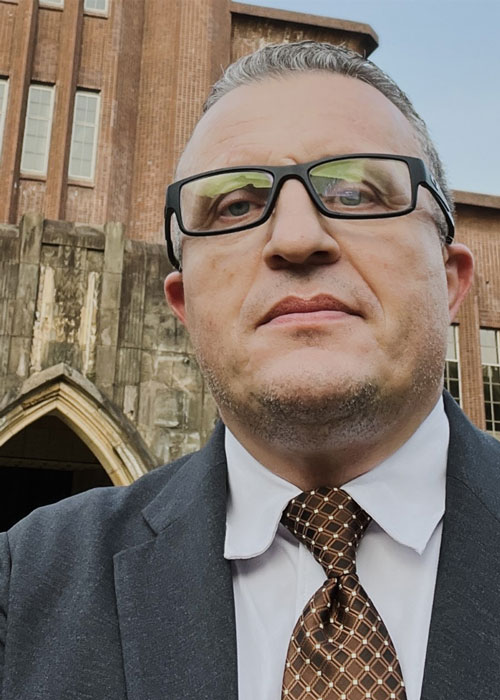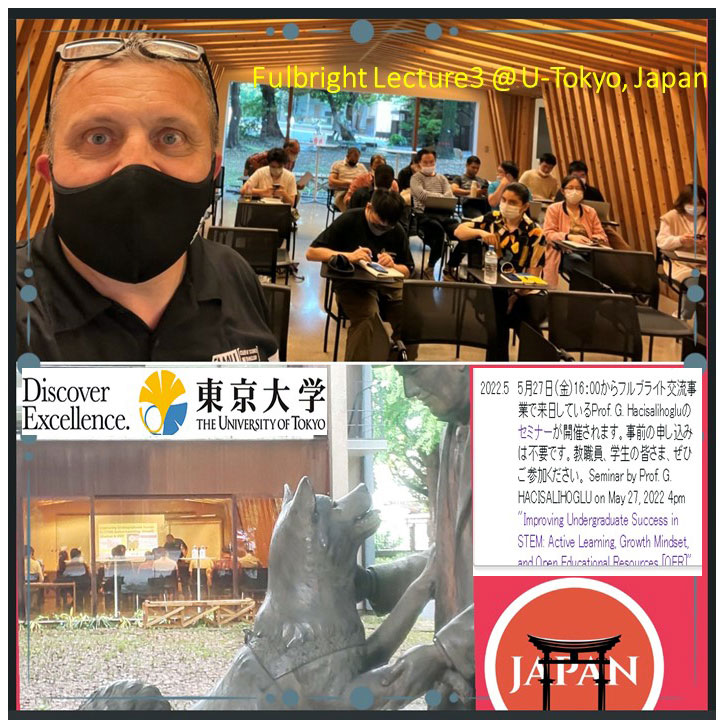Fulbright Chronicles, Volume 2, Number 1 (2023)
Author
Gokhan Hacisalihoglu
Abstract

This commentary provides an overview of my Fulbright experience in Japan, and how it changed my world view and advanced my career trajectory. The lectures were well-received, offering a good balance of STEM and STEM-learning topics. Fulbright opened new avenues for me to contribute to knowledge and changes. In our rapidly evolving world, broadening international connections and new cultural immersion in Japan were invaluable experiences.
Keywords
Japan • STEM • Covid-19 • learning • exchange our world
Global Exchanges Background
The Covid-19 pandemic affected everyone and everything, including higher education. After two years of nearly worldwide closures, 2022 offered an exciting opportunity to resume international travel and global exchanges. I was awarded a Fulbright Specialist (FS) grant in Japan, working in the area of plant sciences. My assignment was to deliver a series of lectures at the University of Tokyo (U-Tokyo), through which I would share my knowledge, strengthen the link between my home university, Florida Agricultural & Mechanical University (FAMU), and U-Tokyo, and gain international experience.
When I traveled to Japan on May 2022, I joined the ranks of some 400 United States scholars who have shared their expertise with host institutions abroad each year through the Fulbright Specialist Program (FSP). My project focused on three main goals: to provide students with a firm grounding in plant nutrition and seed phenomics; to acquaint faculty and students with recent developments in successful undergraduate student research in science, technology, engineering, and mathematics (STEM) fields; and to jointly seek out future collaboration opportunities.
Accomplishments and Outcomes
My host university, U-Tokyo, is considered the top university in Japan. Fulbright lecture participants came to learn about modern plant biology and STEM education. After discussing the details with the host, we decided to offer three lectures via in-person and online formats.
The first lecture summarized developments in the field of plant nutrition during the 21st century. The lecture built on these developments to offer context on present-day research, and then drilled down to the specific topic of gene-mapping from soybean plants for phosphorus deficiency conditions.
The theme of the second lecture was seed phenotyping and the natural variation of traits such as protein, oil, and weight among various food crops, including peas, beans, and flaxseed. The lecture concluded that diverse, high-value varieties of these crops could be used to improve global food security and nutrition, while also adapting to increasing climate stress. Given its link to health and economic well-being, the need to address food security and factors that critically impact it—such as soil, water, plant growth, and crop production—is of great concern worldwide. This is especially true given that climate change due to rising CO2 levels will accelerate the decline of plant yield, loss of biodiversity, and reduction in nutrient content, threatening food systems globally.
The third lecture shared a sneak peek into open education resources and new teaching strategies in STEM education. The lecture covered how interventions in grit, mindset, and self-efficacy can help college students achieve more in STEM areas of study. The lecture went on to describe data showing the relationship between improved mindset traits and increased undergraduate student success in STEM fields.
All three lectures were well attended and received. Overall, it was a rewarding experience and a unique opportunity for the FSP scholars and lecture participants to exchange ideas. Those in attendance included the U-Tokyo Vice Dean of Agriculture and Life Sciences, faculty members, as well as U-Tokyo graduate and undergraduate students. The attendees agreed that the lecture series’ objectives were met, and that the lectures were well-delivered and well-organized. They rated my ability to gain and keep their attention as high, and felt that the lectures were engaging and created interest around a critically important topic.
This One Time in Japan: Professional Reflections
Participation in this FSP required not only scientific involvement, but also cultural and linguistic immersion in a new country. I went to Japan during a time of global transition: after two years of border closures, Japan had only partially re-opened to travelers. Being a Fulbright Scholar in Japan post-pandemic made me fully appreciate the experience; I was very aware of what I had been missing while the borders were closed, and of the value-add that exchanges like this can bring, at both the personal and global levels.
The exchange fostered several ideas for potential ongoing projects. One that really excites me concerns rice nutritional biodiversity. The project explores important physical parameters of grain quality, including nutrition, color, density, volume, and the interactions of all of these. Since rice is a staple food crop for over half of the world population, this project portends new ways to think about health, lipids, and proteins, and their genetic variations.
My FSP experience in Japan exemplifies the importance of being open to learning from and understanding the perspectives of scholars and students in other countries. Undoubtedly, the Fulbright experience helps form worldwide relationships that allow for the cross-pollination of ideas and knowledge. In Tokyo, our cultural differences were not an obstacle; instead, they were the source of many learning opportunities. In addition to conducting the lecture series, I was able to meet with local volunteers with whom I learned about basic Japanese language, culture, and perspectives. I was also able to share my own perspective on academic life in the United States.
The Fulbright experience was a stepping stone toward a more expanded world view and greater personal and professional adaptability
For me, the Fulbright experience was a stepping stone toward a more expanded world view and greater personal and professional adaptability. The experience also heightened the likelihood that I can achieve a lasting impact on food security, a challenge of global import. As a result of this experience, I am also interested in setting aside the time to learn and study the Japanese language. In short, it is hard to overstate the positive effect that this experience has had on my life. Fulbright made all this happen.
In terms of career trajectory, my experience as a Fulbright Scholar shaped and developed my mindset not only as a scientist, but also a policy designer. The Fulbright experience allowed me to pursue a fellowship in Washington, DC to learn about US foreign policy and international development programs. This has the potential to greatly impact the trajectory of my future career.
While the FSP experience is very rewarding, it can also be stressful at times. The ongoing Covid-19 pandemic and restrictions in Japan made this even more true. Some of the things I did to help manage my visit during pandemic were to get fully vaccinated, wear a face mask everywhere, and use hand sanitizers continuously throughout the day.
Concluding Remarks
Lastly, Fulbright is life-changing and more than worth the time and energy it requires. For me, the experience provided an opportunity for cultural immersion, while also helping me gain new skills. Japan is a wonderful place, with many surprises in every city. The specific FS project in which I was involved provided an excellent springboard for advancing plant biology, as well as for strengthening inter-institutional linkages with the host (U-Tokyo, Japan) and Florida A&M University, US. Overall, it was an exceptional experience for everyone involved, resulting in the exchange of many scholarly ideas and increased mutual understanding between the US and Japan. The Fulbright experience allowed me to encourage students in Japan to explore plant biological sciences. No matter one’s discipline, there is a Fulbright program that fits and will no doubt be just as rewarding.
Notes
- Baker, C. & Hacisalihoglu, G. (2014). Excursions in teaching plant sciences through local ethnobotany of the food–medicine continuum. In: Quave CL, editor. Innovative strategies for teaching in the plant sciences. New York, NY: Springer. p. 245-259.
- Hacisalihoglu G (2021). From Growing to Biology: Plants 1e. Publisher: Florida State University. ISBN13: 9781736577912 https://diginole.lib.fsu.edu/islandora/object/fsu%3A761479
- Hacisalihoglu, G. (2007). Germination Characteristics of Three Warm-Season Turfgrasses Subjected to Matriconditioning and Aging. HortTechnology 17(4), 480-5. https://journals.ashs.org/horttech/view/journals/horttech/17/4/article-p480.xml
- Hacisalihoglu, G., Hilgert, U., Nash, E.B., and D.A. Micklos (2008). An Innovative Plant Genomics and Gene Annotation Program for High School, CC, and University Faculty. Cell Biology Education-LSE 7(3), 310-6. https://www.ncbi.nlm.nih.gov/pubmed/18765753
- Hacisalihoglu, G. (2020). Zinc (Zn): The Last Nutrient in the Alphabet and Shedding Light on Zn Efficiency for Future of Crop Production under Suboptimal Zn. Plants. 9(11), 1471; https://doi.org/10.3390/plants9111471

Biography
Dr. Gokhan Hacisalihoglu (PhD, Cornell) is a Professor of Biology at Florida A&M University, US. He is an often-published author and maintains active research on food crop improvement and dietary nutrients. In May 2022, he was Fulbright Specialist at University of Tokyo. He gratefully acknowledges Prof. T. Fujiwara (U-Tokyo) as an important part of this project and host. This study was supported by FB-US State Department. World Learning, Fulbright Japan, and S. Yamashita are sincerely thanked. Learn more at https://twitter.com/GHagrifoodbio. He can be reached at gokhan.h@famu.edu
